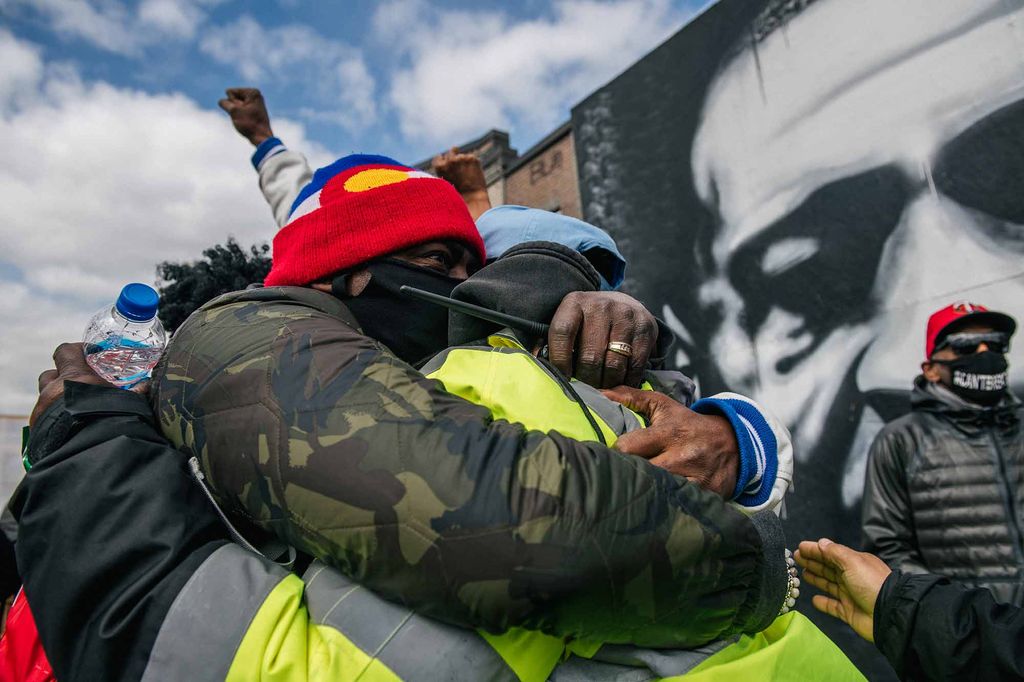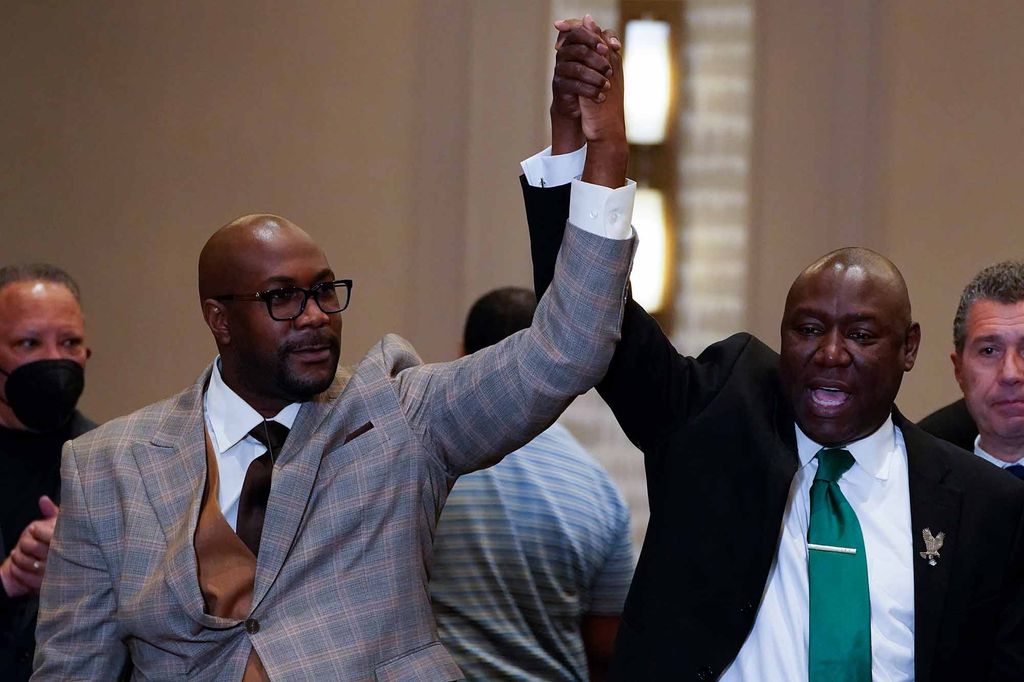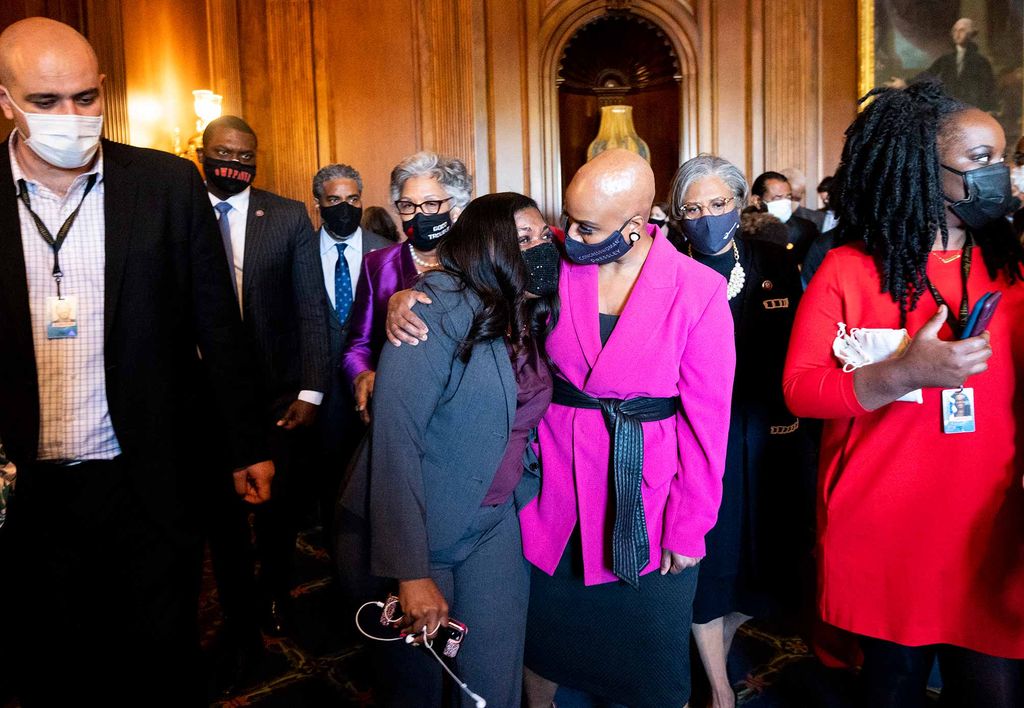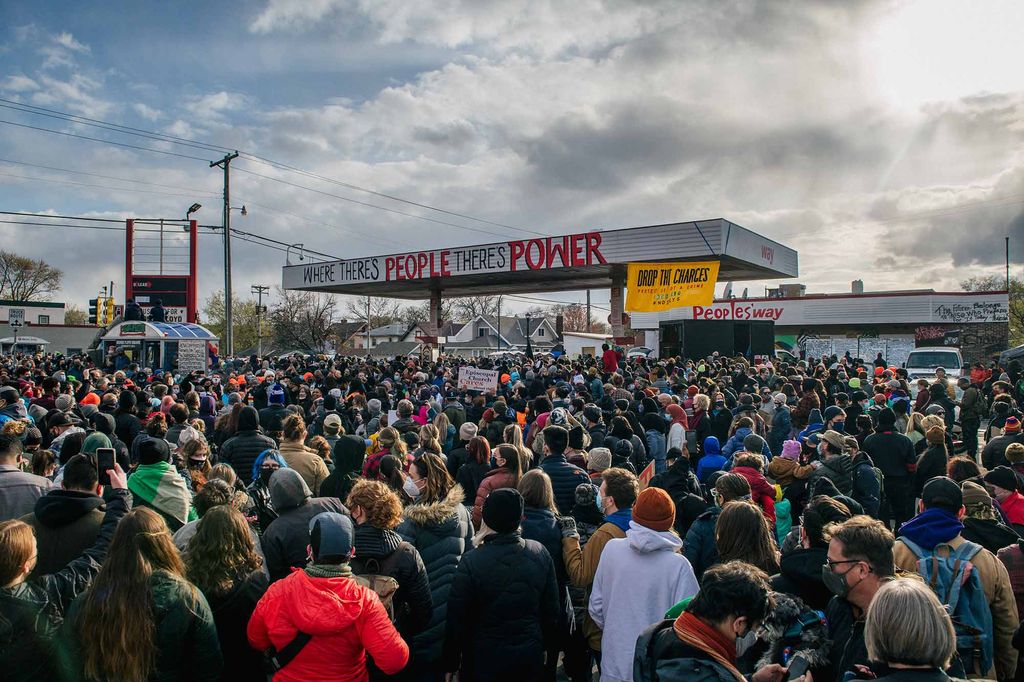Derek Chauvin Trial: BU Community Reacts to the Guilty Verdict
Derek Chauvin Trial: BU Community Reacts to the Guilty Verdict
“We need wholesale reform, not just piecemeal changes”

The verdict came quickly. Barely 24 hours after closing arguments concluded Monday in the trial of ex-Minneapolis police officer Derek Chauvin, accused of murdering George Floyd, jurors on Tuesday rendered their judgment: guilty of second-degree unintentional murder, third-degree murder, and second-degree manslaughter.

It was a case that riveted, angered, saddened, and divided the nation, since the afternoon of May 25, 2020, when a cell phone video captured Chauvin, who is white, kneeling for more than nine minutes on the neck of Floyd, a 46-year-old Black man, while he lay handcuffed and facedown on the ground, until his body went limp. More than 20 times, Floyd uttered, “I can’t breathe.” But even as he cried out for his dead mother and his children, gasping, “They’ll kill me, they’ll kill me,” Chauvin never removed his knee.
Defense lawyers blamed Floyd’s preexisting health conditions and past drug use as viable causes of his death, and said the video did not tell the complete story of the events that day. Prosecutors were relentless in arguing that, in fact, the video said it all. “Believe your eyes,” lead prosecutor Steve Schleicher told the jury—made up of six white people, four Black people, and two multiracial people—in his final arguments.
But now what? What do Floyd’s death, Chauvin’s actions, and the jury’s verdict mean for a nation reeling over the killing of another Black person at the hands of a white police officer? Will there be police reforms as a result of the case? Will there be a racial reckoning? Or will nothing change?
BU Today asked students, faculty, and staff from across campus for their reactions to the verdict and whether police reforms are needed.
Christopher Rhodes
College of General Studies lecturer in social sciences
This verdict—guilty on all counts—was the right verdict for the trial and the only one that fit the facts of the case. The most severe charge, second-degree murder, is met if a person kills another while committing a felony, such as assault, without the assailant necessarily intending to kill the victim. The prosecution demonstrated that the officer’s actions served no justified legal or practical purpose, and thus constitute an assault, no different than if one civilian were to violently pin another to the ground in the manner that Floyd was restrained. Second, the witnesses and evidence presented during the trial clearly demonstrated both that Derek Chauvin’s actions—pinning George Floyd to the ground with his knee on Floyd’s neck for nearly 10 minutes—caused Floyd’s death. Put these two things together, and Chauvin was guilty of the charge, and the guilty verdict on the lesser charges also follows from the evidence.
I absolutely believe that police reform is needed. Even after the outrage that emerged last year from the killing of George Floyd and other Black people, we’ve continued to see police use deadly force against Black people, even when they have been unarmed or attempting to surrender. Some of these killings have happened during the actual trial of Derek Chauvin. Even with this guilty verdict, it’s not enough to punish a few officers for these heinous acts. We need real reform and sustained accountability for police to change the culture of policing and to deter unnecessary uses of violence and lethal force. Things like body cameras; de-escalation, antibias, and community policing training; shifting resources and response procedures to a wider variety of responders, such as mental health professionals; widespread procedures to hold accountable not only violent officers, but also fellow officers who cover for them and the departments and organizations that shield them from consequences; and a wider racial reckoning that America has continued to avoid. We need wholesale reform, not just piecemeal changes, to shift the atmosphere that allows these killings and police violence to routinely happen.

Sandro Galea
School of Public Health dean and Robert A. Knox Professor
It is right that anyone who commits the crime of which Derek Chauvin was convicted be held to account. The broader context in which the crime occurred—the country’s history of racism and police violence—made the pursuit of justice all the more imperative in this case. President Biden was expressing the feelings of many, I think.
Any time security forces abuse the populations they are meant to protect, it constitutes a threat to public health. We have hosted multiple conversations at our school—including an upcoming event for our community this week—addressing race, criminal justice, and policing as a public health concern. Police reforms can do much to address abuses. Reforms can include ending qualified immunity, demilitarizing the weapons and tactics used by police, better training around conflict de-escalation, and working to support the efforts of officers who genuinely wish to protect and serve, by fostering a culture among police where abuses are anathema and no longer tolerated. The events of the past year have reflected the urgency of embracing such measures.
Alexander Puri (COM’21)
This was the correct verdict in my view. Derek Chauvin suffocated George Floyd as he knelt on his neck for over nine minutes on camera, knowing full well that his actions would result in Floyd’s death. I believe that he will now face the appropriate levels of accountability that too many other officers have sadly avoided for similar senseless and lethal acts of violence against unarmed African Americans.
Reforms are still absolutely necessary. The first thing that comes to mind is proper antiracist training within departments. Black Americans being killed by police is a symptom of a much larger issue with policing, as they far too often face unwarranted and disproportionate levels of questioning, harassment, traffic stops, and physical assaults at the hands of law enforcement. I also feel that police need to receive proper de-escalation training so that they aren’t so quick to draw their weapon when the situation doesn’t call for it.

Monica Wang
School of Public Health associate professor of community health and BU Center for Antiracist Research associate director of narrative
Today’s verdict reflected accountability, a recognition of the value of Black lives that generations have fought for in this country. True justice means we should never have trials such as these. There is much work to continue to do, but for now a moment of pause, a breath inhaled and exhaled for George Floyd.
Christopher Robinson
Disability & Access Services outreach and training coordinator
To me, the verdict is a correct response to a wrong, incorrect act. The verdict won’t be “right” until sustained ubiquitous change in policing validates the verdict.
Police reforms are needed to address ill treatment of Americans; the death of Black Americans is symptomatic of a chronic problem that needs to be addressed and treated. The death rate of Black Americans should not be the first and only catalyst for change. Delegation of domestic issues and social service expertise away from police and toward those social service professionals should be the start.

Shea Cronin
Metropolitan College assistant professor of criminal justice and associate chair of applied social sciences
[It’s] unquestionably the right verdict. If the force Chauvin used to murder George Floyd were reasonable, the very definition would need to be changed. Our society should never tolerate such cruelty in the application of the law.
Guilty verdicts that hold individual officers responsible are not enough. Although legal accountability is necessary, comprehensive reform is—has always been!—urgent. The aim is prevention. That starts with rethinking the very role of the police. Then we can work toward restrengthening direct community oversight that empowers communities of color in particular and internal reforms—selection, training, supervision, transparency—that infuse our officers with empathy, compassion, patience, and perspective that are demanded of the profession in our society.
Saida Grundy
College of Arts & Sciences assistant professor of sociology and of African American studies
President Biden said before the verdict that he was “praying for the right verdict.” I hope he understands how much of this language around Black protest has traded in racist rhetoric about Black liberation. He may not be aware of the racialized tone of his rhetoric, but he was very much around when the criminalization of Black liberation movements was putting its foot on the pedal. Just this week, Florida signed a bill that tosses the First Amendment aside to deliberately criminalize Black protest.
I think that the president has a moral compass, but structural racism isn’t a morality issue. Calling for “peace” from Black communities is insulting when the responsibility of nonviolence is the burden of the state. Reacting directly to the most violent entity in your community is justified. After all, when white people do this, we have historically called it patriotism, “resisting tyranny,” or “revolution.”
That we only call for peace when Black people speak America’s native tongue of direct action and confrontation is a problem. Law enforcement (along with other state apparatuses such as school resegregation and voter suppression) are the primary sources of harm to Black people in America. It is outrageous to call for peace from the victims and not the aggressors.
Reforms? Reforms?? It’s a rotten tree. There is no “reform” possible with a system working exactly as it was designed. Police contact with marginalized communities puts marginalized communities in danger. Every time. Consistently. For centuries. It is only by reducing police contact with the populace—i.e., reducing the size and scale of law enforcement itself—that we can keep these populations safe.
I would like to send my love, regards, protein powder, and vitamin supplements to the Black men being imprisoned within the Minnesota Department of Corrections.

Harvey Young
College of Fine Arts dean
Based on what I read based on news coverage, it seems to be the right verdict. I can understand how a jury might give a police officer in mortal danger the benefit of the doubt for a split-second decision. However, this was not a split-second act. There were hundreds of moments—hundreds of seconds—when Officer Chauvin could have simply stood up and saved a life during the nine minutes when he kneeled on Mr. Floyd’s neck and agonizingly, slowly killed him.
We need widespread education, not only in police training, but within every institution, to stop skin complexion and assumptions of racial identity from determining whether someone gets the job, gets the promotion, gets a mortgage, gets to live another day.
Karen Pita Loor
School of Law clinical associate professor of law and associate dean for experiential education
The jury on the George Floyd case did the right thing, but I agree with Minnesota Attorney General Keith Ellison: this is not what we should call justice. Justice requires George Floyd—and so many who came before him and after him, like Daunte Wright and Adam Toledo—to be alive today, to not be terrorized by law enforcement on the streets and even in their own homes like Breonna Taylor. Minnesota police officer after police officer testified that Derek Chauvin deviated from police conduct, but what we bore witness to on that video was the policing that people of color routinely confront. It is violent and racist and can be deadly.
Mikajah Hayes (Questrom’21)
This was the correct verdict. I believe that people need to be held accountable for their actions no matter their occupation. True justice was served today.
I think that if you look back at the history of policing in America, it’s clear that some changes are needed to ensure that all people are treated fairly. It’s not the police’s job to determine who has the right to live; historically they have abused their power and taken that choice from many people of color. We need to completely change the way that we look at policing and addressing crime. We need to create programs that actually treat the causes of crime: poverty, lack of housing, and food insecurity. Countries that have taken this approach have seen dramatic drops in crime rates.

Sophie Godley
School of Public Health clinical assistant professor of community health sciences
This is absolutely the correct verdict, and yet, there is still an enormous amount needed to change to end systemic racism and racist police violence. All of us who watched those agonizing nine minutes are responsible for creating the society we want to live in—and those of us with white skin privilege are tasked with continuing to fight for racial justice.
We desperately need dramatic and powerful change to policing in the United States—particularly in Black and Latinx neighborhoods and communities. First, we need to end the blue wall of silence—including all the way up to the prosecutors’ offices that have historically denied African American victims of police violence even a day in court. Second, we need to stop asking police officers to do things they are not trained to do—they are not social workers or mental health counselors. We need to demilitarize the police. We need to stop treating police as if they are celebrities or above the rest of us.
Kayla Dungee (COM’21)
We saw a man killed on video over the legitimacy of a $20 bill. I cannot believe we had to have a murder trial to determine whether Derek Chauvin killed George Floyd when his murder was recorded for the entire world to see. I understand the due process of the law, but blatant murder cases like this should go over without a single question or moment’s hesitation of whether Chauvin would be convicted or not.
Even with the lukewarm reforms that have been implemented in some parts of the country, police are unjustly and disproportionately killing Black and brown people. Defunding is long overdue, with a desperately needed restructuring of law enforcement as a whole. Police have far too much power, and it’s time to rethink who is and should be a first responder.

Paula Austin
College of Arts & Sciences assistant professor of history and of African American studies
Many will see Chauvin’s guilty verdict as one that holds him accountable for murdering George Floyd. And maybe it is. It may even result in punishment for that murder. I certainly hope it brings something of relief to George Floyd’s family. Considering its alternative, it is meaningful. However, because the trial, by design, was not about policing itself, the verdict does very little to transform a system that made it possible for Derek Chauvin to horrifically and brutally kill a person in the street, while fellow police saw no reason to intervene. This tells us much—that Chauvin’s behavior was seen as normal in day-to-day policing.
I am currently working on research that looks at the history of anti-Black police violence and demands for reform. What I know so far is that many of the “reforms” that are being implemented and that have been implemented—civilian review boards, bodycams, for example—have not changed day-to-day police use of excessive force and police violence, nor have they changed the structures within policing that allow individual police to face little to no repercussions for their actions.
I hope we are moving ever closer to shifting municipal, state, and federal budgets to spend money differently in communities so that everyone has what they need to live and thrive, and we can rethink what “public safety” means. We have examples of this, too, in our history. (Folks will say we can’t “defund” the police, but we have a long history of defunding lots of things: public education, city services, etc., where that money has been put somewhere else.)
Raul Fernandez (COM’00, Wheelock’16)
Wheelock College of Education & Human Development lecturer and associate dean for equity, diversity, and inclusion
No one should be celebrating tonight. While GUILTY was clearly the correct verdict in this case, it will undoubtedly be twisted by those resisting real change as evidence that, “Hey, you see, the system works and there is accountability for police!” Nothing could be further from the truth. While police unions and chiefs may be willing to cast Derek Chauvin as rogue, the truth is that the brutal and criminal “policing” he engaged in happens all too frequently, with people of color disproportionately being victimized. Derek Chauvin is no rogue. He’s a cog in a system that devalues Black and brown lives—a system that needs to go. That would look a whole lot more like justice than what happened today.

Judith Scott
School of Social Work assistant professor
This is the right verdict—guilty on all charges. Derek Chauvin, who took an oath to protect the community he serves, killed a member of that community. He used unnecessary force to dehumanize and crush the life out of George Floyd. Witnesses pleaded with Chauvin to stop. He ignored them and his duty to provide medical aid.
Of course, police reforms are needed along with some societal reforms. So many police officers who killed Black Americans have not been held accountable. We need an overhaul of the policies and procedures in the criminal justice system regarding the prosecution of police officers. Those who enforce the law should be accountable to the law. We should redirect some of the money spent on policing to invest in communities’ infrastructure and address educational, financial, and health inequities. It is imperative that we implement policies and laws to dismantle systemic racism.
Maxwell Fisher (CAS’23)
While I believe the verdict today was righteous in the sense of accountability, the overall goal shouldn’t be to lock up more cops. We need to reimagine and create a world where state-sanctioned violence on Black bodies does not occur in the first place, where we focus on ways to prevent crime.
As many responded with relief to Derek Chauvin’s conviction, news came that a 15-year-old Black girl had been shot and killed by police in Columbus, Ohio. To prevent further killings of Black people by police officers, we need to begin by defunding police departments and reinvesting those funds in social services, such as housing and health care.
Reforming systems built on racism and exploitation is a start, but abolishing those systems altogether should be our ultimate goal.
David Janey
Associate director of BU Financial Assistance
If the police officer was Black and the individual he killed was white, the nation would not be worried about the outcome of the trial. In those circumstances, a guilty verdict would be a forgone conclusion in this obviously “open-and-shut” case. The evidence [against Chauvin] was overwhelming and captured on video, and even with that there is no guarantee that justice will be done when a Black life is taken.
Show me 50 bad cops and 950 good cops who refuse to testify against the bad cops, and I’ll show you 1,000 bad cops. It’s about dismantling the “blue wall of silence.” Police complain when community members refuse to help them solve crimes by dropping a dime on offenders. But police do the very same thing when good cops refuse to drop a dime on bad cops, and that hypocrisy is killing us.
Louis Chude-Sokei
CAS professor of English, director of BU’s African American Studies Program, and George and Joyce Wein Chair in African American Studies
I appreciate this collective breath, a shared symbol of that which was denied George Floyd. I appreciate the glimmer of possibility. But what happened here was that an individual was found guilty for murdering another individual. George Floyd and so many others were not abused and murdered just by individuals, but by a system that has consistently failed those who are Black, brown, and “other” to it. That system has yet to be proclaimed guilty, and so tonight it breathes too.
Boston University Diversity & Inclusion has put together a list of resources and upcoming events that explore police violence and racial justice. Find them here.
Comments & Discussion
Boston University moderates comments to facilitate an informed, substantive, civil conversation. Abusive, profane, self-promotional, misleading, incoherent or off-topic comments will be rejected. Moderators are staffed during regular business hours (EST) and can only accept comments written in English. Statistics or facts must include a citation or a link to the citation.